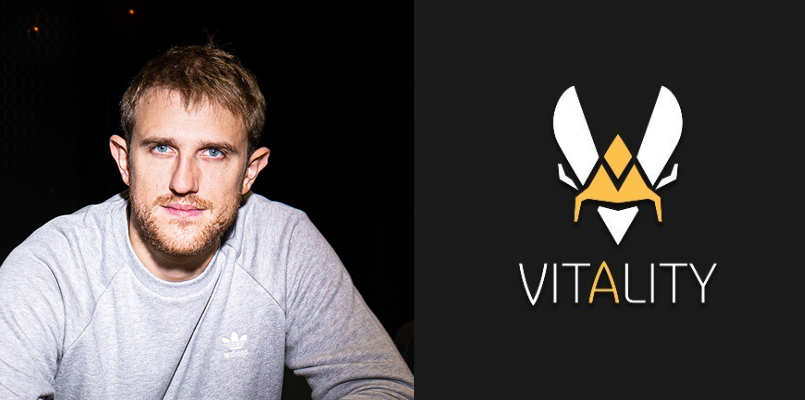Mentioned in this article
League/Tournament Brands:
From the three-horizontal stripes of its adidas jerseys to a training center housed in a national soccer stadium, Team Vitality pushes the full image of a traditional sports club. But the French esports brand is also as digitally-minded as any modern startup. Its newly opened Paris headquarters includes a LAN gaming center and co-working space, all designed to offer new layers of revenue.
“We are a French team, we want this place for our fans,” Nicolas Maurer, CEO and co-founder of Team Vitality, told The Esports Observer on opening night of the “V-Hive” headquarters. “Making Vitality a big billboard [for esports] at the heart of the city, it says a lot. We want to help esports grow, become more and more mainstream, and Vitality’s destiny is intertwined with that.”
The facility is one of the end results from over $35M USD investment from esports venture fund Rewired.gg. Maurer declined to disclose the cost of the facility, highlighting the secrecy of figures that is still commonplace in the esports industry. “I’d love to share my player’s salaries, I’d love to share more numbers, but it only works if a full ecosystem is doing it,” he said. “For that to happen, we need players to be comfortable with this, because it would clear a lot of misconceptions, figures from here and there.”
“I think openness of the market is good. But right now, if I’m the only one doing it, I’m hurting myself.”

This month, Forbes published its second annual list of the highest valued esports teams. It claimed the revenues were estimated based on interviews with company executives and investors. “I think there’s a lot of confusion, misunderstanding with figures. When it comes to the valuations people say it’s artificial, but a valuation is artificial in itself,” said Maurer.
“You’re not saying the valuation of a new tech business or esports team is ‘x’ because of the revenue it generates. We all know it’s a bet on the future, so of course it’s meaningful to a point.”
While Team Vitality itself is not on the Forbes list, all but three of those that are have bought into franchise-style League of Legends competitions; run as part of a global network by publisher Riot Games. Four are competitors in the European division, which Team Vitality also bought into for €8M ($9.2M) after a lengthy application process in 2018.
“The numbers for year one are extremely good, it is a success, but that’s not interesting to me. What’s interesting to me is the dynamic of the League of Legends European Championship (LEC) and where we’re heading,” explained Maurer. While introducing a near-identical revenue sharing structure as its North American counterpart, the LEC underwent a full rebrand, and created new expo spaces for its partner teams during its arena finals events.

“What matters is the revenue in year five or ten [..] They have created something that has attracted people, the product is great to watch, it’s a great team, a lot of sponsors, well-integrated.”
Despite running for six seasons even before the rebrand, the LEC is still broadcasted weekly out of a Berlin studio, with most of the players taking residence in the city. In contrast, Activision Blizzard moved in fast to build city-based leagues around two entirely new esports properties; the Overwatch League (OWL) and Call of Duty League (CDL). Though, as Maurer points out, the OWL had to backtrack from its original year three plan of regular home-and-away games.
“In sport we always talk about match day revenue, it’s key,” he said. “In esports, we don’t have that revenue. It would allow us to monetize our fans, to offer a great experience that’s unique. To welcome other teams to our facilities and go to theirs. I love the idea, but agree that there’s no need to rush to do it.”
One of Vitality’s best performing teams competes in the futuristic soccer simulator Rocket League. Its co-branded Renault Sport Vitality squad took the game’s grand prize in 2019, and Maurer agreed that this game too would benefit from a closed buy-in model (as recently reported by SportsBusiness Journal), mainly due to the publisher’s ability to select team brands with long-term potential.

“That’s key; you don’t want teams that accidentally happen to be there because they have three good players, but won’t do anything. No fans, no brand,” he said. “I know in Europe people are more conservative about franchising, they think it might destroy the competitiveness. But North American sports leagues are extremely competitive and tough, it’s great to watch.”
Like European soccer, there are some video games where franchising is near impossible. The most notable is Counter-Strike: Global Offensive (CS:GO); the biggest esport in which the publisher does not run any tournaments or leagues themselves. Vitality’s own CS:GO squad is currently ranked in the top ten worldwide by both ESL and HLTV, and came close to winning this year’s edition of ESL One Cologne.
“The ideal Counter-Strike model is not the current model,” said Maurer. “There is no revenue sharing. All of the money in the ecosystems goes into player’s pockets, and don’t get me wrong, I want my players to be very rich. They’re the talent, the ones playing everyday […] but everyone benefits from the success of the league.”
He added that the openness of the Counter-Strike system is part of the game’s culture, with several tournament organizers having heavily pushed the ‘zero to hero’ model. It explains why, despite the lack of financial rewards, larger esports brands are still entering the game.
“We’re spending money with the goal of building a team that’s able to win and create a legacy. My Counter-Strike team, for example, I want it to be able to win several Majors in the next five years. Maybe we’ll succeed, maybe we won’t, it’s sports.
“But I want to give them the resources, the players and infrastructure to do that. If we don’t do that, what’s the point?”

